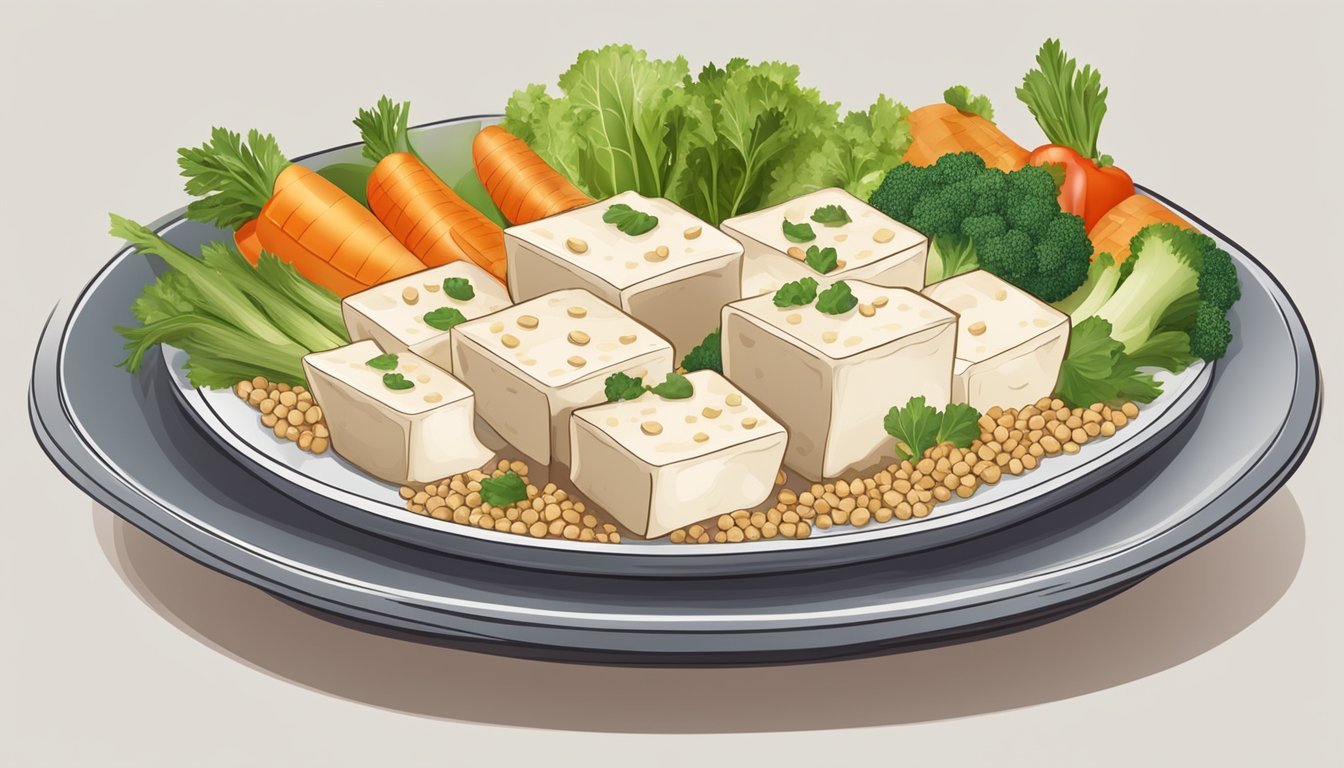25 Best High-Protein, Low-Carb Foods for a Healthy Diet
Top Choices for a Balanced Diet
Choosing foods high in protein and low in carbs can provide numerous benefits for those looking to improve their diets and manage their weight. These foods help maintain muscle mass, support metabolic health, and keep blood sugar levels stable, making them ideal for a balanced, health-conscious eating plan.
Incorporating a variety of high-protein, low-carb options into daily meals can also enhance overall nutritional intake. These choices are not only beneficial for those on specific diet plans but also for anyone aiming to adopt a healthier lifestyle.
1) Chicken Breast
Chicken breast is a popular option for those seeking a high-protein, low-carb food. It is versatile, easy to cook, and often used in healthy meals.
A typical serving of chicken breast provides around 31 grams of protein. This makes it an excellent choice for building and repairing muscles.
Prepared in a variety of ways, chicken breast can be grilled, baked, or sautéed. These methods require minimal ingredients, making the dish healthier.
Some favorite recipes include baked lemon-pepper chicken and feta-stuffed chicken breast. Both are low in carbohydrates and packed with flavor.
For those on a tight schedule, quick recipes like creamy chicken and mushrooms help maintain a low-carb diet. Chicken breast helps in achieving dietary goals without sacrificing taste.
Adding chicken breast to salads or soups can further increase protein intake. Its mild flavor allows it to blend well with a variety of ingredients.
2) Greek Yogurt
Greek yogurt stands out as an excellent choice for those looking to increase protein intake while maintaining low carbohydrate levels.
One container, typically 5.3 ounces, of non-fat plain Greek yogurt provides around 15 grams of protein and only 6 grams of carbohydrates.
Greek yogurt is lower in sugar compared to regular yogurt, making it suitable for low-carb diets.
This dairy product is rich in probiotics, which promote gut health. It also contains essential nutrients, such as calcium, aiding in bone health. Low-fat varieties, like FAGE, offer a balance of taste and nutrition.
Plain Greek yogurt's versatility allows it to be used in various dishes, from smoothies to savory sauces, fitting easily into any meal plan.
3) Salmon
Salmon stands out as a top choice for those aiming to increase their protein intake while keeping carbohydrates low. This fish is not only packed with protein but also contains essential nutrients such as omega-3 fatty acids.
A typical salmon fillet provides around 22 grams of protein per 3-ounce serving, making it an excellent protein source. Additionally, salmon contains minimal carbohydrates, making it suitable for low-carb diets.
Salmon is versatile and can be cooked in various ways, including grilling, baking, and pan-searing. It pairs well with a range of herbs, spices, and vegetables, making it an ideal staple for diverse and nutritious meals.
Salmon also contains important vitamins and minerals, including vitamin D and selenium. These nutrients contribute to overall health, supporting functions like immune response and bone health.
Eating salmon regularly can contribute to heart health due to its high omega-3 fatty acid content. These healthy fats help reduce inflammation and may lower the risk of chronic diseases.
4) Egg Whites
Egg whites are an excellent choice for those seeking a high-protein, low-carb food.
Each egg white contains about 4 grams of protein and virtually no fat or carbohydrates.
This makes them perfect for individuals looking to increase their protein intake without consuming extra calories.
Aside from protein, egg whites offer minimal nutrients compared to whole eggs.
While whole eggs contain vitamins, minerals, and healthy fats, egg whites are predominantly composed of water and protein.
Egg whites are particularly beneficial for weight loss diets.
Due to their low calorie count of approximately 15 calories per egg white, they help in reducing calorie intake while satisfying hunger.
Including egg whites in your meals can be versatile.
They can be used in omelets, scrambled eggs, and even as a base for protein shakes.
Their mild flavor makes them easy to combine with other ingredients.
5) Tuna
Tuna is an excellent high-protein, low-carb food. It's widely available in canned, fresh, or frozen forms. A serving size of 3 ounces offers around 20 grams of protein and negligible carbohydrates, making it ideal for those on a low-carb diet.
Tuna is also rich in omega-3 fatty acids, which support heart health. Other nutrients found in tuna include selenium and vitamins B12 and D. These contribute to a balanced diet and overall well-being.
For meal ideas, tuna is highly versatile. It can be incorporated into salads, casseroles, and even snack options like bell pepper boats. Its mild flavor pairs well with various herbs, spices, and vegetables.
Additionally, homemade tuna patties are a nutritious and quick option. They can be made using tuna, chopped onions, garlic, eggs, and almond flour, then fried until golden. This provides a convenient, high-protein meal.
Tuna is also low in calories, making it a suitable choice for those aiming to manage their weight. With its combination of high protein and minimal carbs, tuna is a valuable addition to any low-carb eating plan.
6) Turkey Breast
Turkey breast is an excellent choice for those seeking high-protein and low-carb foods. It provides a generous amount of protein, making it ideal for muscle growth and repair.
With only about 105 calories per 100 grams, turkey breast is lower in calories compared to other poultry options. The protein content is impressive, with around 22 grams per 100 grams serving.
Turkey breast is virtually carb-free, containing 0% carbohydrates. This makes it particularly suitable for low-carb diets such as keto. Additionally, it has minimal fat content, roughly 1%, which helps maintain a lean dietary profile.
Vitamins and minerals are also abundant in turkey breast. It is rich in vitamin B6, which plays a crucial role in energy metabolism and brain health. Zinc, a mineral important for immune function, is also present.
To prepare turkey breast, one can bake, grill, or roast it. Marinating the meat enhances its flavor and keeps it moist during cooking. It pairs well with a variety of herbs and spices.
Overall, turkey breast stands out as a nutritious, high-protein food that fits well into low-carb diets.
7) Cottage Cheese
Cottage cheese stands out as an excellent source of protein while maintaining a low carbohydrate content. For example, one cup of low-fat (1% milkfat) cottage cheese contains approximately 163 calories, 2.3 grams of total fat, and just 3 grams of carbohydrates.
This dairy product is rich in protein, providing around 14 grams per serving. Such a high protein content makes it a substantial choice for those looking to increase their protein intake without consuming a lot of carbs.
Cottage cheese is also versatile in the kitchen. It can be used in both savory and sweet dishes, from salads and dips to smoothies and desserts. This makes it easy to incorporate into various meals throughout the day.
The texture can be an issue for some, but blending cottage cheese with other ingredients can create a smoother consistency, making it more palatable. It pairs well with fruits, vegetables, and even in baked goods.
Cottage cheese is not only high in protein but also packed with essential nutrients like calcium. It's a nutritious option for anyone following a low-carb diet.
8) Shrimp
Shrimp is a high-protein, low-carbohydrate seafood option that fits well into many dietary plans. Each 3-ounce serving of shrimp provides about 20 grams of protein while containing virtually no carbs. This makes shrimp an excellent choice for those looking to manage their carbohydrate intake.
Not only is shrimp low in carbs, but it is also low in fat. This makes it a lean protein source that can support various health goals, from weight management to muscle building.
Shrimp is rich in essential nutrients, such as selenium, which helps protect cells from damage, and omega-3 fatty acids, which support heart health. Additionally, vitamins and minerals like vitamin B12, iodine, and zinc contribute to overall well-being.
While incorporating shrimp into meals, consider simple cooking methods such as grilling, baking, or steaming to preserve its nutritional value. Pairing shrimp with non-starchy vegetables can create a balanced, nutritious meal.
Cooking shrimp with herbs, garlic, and lemon enhances its flavor without adding unnecessary calories or carbs. These combinations make shrimp a versatile ingredient suitable for a variety of healthy, low-carb recipes.
9) Tofu
Tofu is a dietary staple for many seeking high-protein, low-carbohydrate options. A half-cup serving of tofu contains approximately 10 grams of protein and just 3.5 grams of carbohydrates.
It’s a highly versatile ingredient, easily absorbing the flavors of any dish it is cooked with. This adaptability makes it suitable for a wide variety of cuisines and cooking methods.
Rich in essential amino acids, tofu provides all the necessary building blocks of protein. It also offers important vitamins and minerals, enhancing its nutritional profile.
Tofu is low in calories, making it a favorite in calorie-conscious diets. For those on meat-free or plant-based diets, it serves as an excellent alternative to animal protein. Tofu's nutritional benefits include being low in fat and sodium, further establishing it as a health-friendly choice.
Consider using tofu in stir-fries, soups, or even as a meat substitute in traditional dishes. Its mild flavor ensures it blends seamlessly with other ingredients while contributing valuable nutrients.
10) Lean Ground Beef
Lean ground beef is an excellent source of protein with minimal carbs. It's versatile and can be included in a variety of recipes.
For those seeking a high-protein, low-carb meal, lean ground beef offers approximately 23 grams of protein per 3-ounce serving. Its low carbohydrate content makes it suitable for low-carb diets such as Keto.
Opt for dishes like beef stir fry, stuffed peppers, or taco salads to incorporate more lean ground beef into your diet. Pairing with vegetables ensures a balanced, nutritious meal.
Cooking methods like grilling, sautéing, or baking can enhance the flavor without adding unwanted carbs. Such methods also help in retaining the nutritional benefits of lean ground beef.
Choosing lean ground beef helps reduce the intake of saturated fats while enjoying a protein-rich diet. Utilizing it in meal preps can make healthy eating both convenient and delicious.
Understanding High-Protein, Low-Carb Diets
High-protein, low-carb diets involve reducing carbohydrate intake and increasing protein consumption. This approach can offer benefits such as stable blood sugar levels and satiety while affecting the body's metabolism in specific ways.
Benefits of High-Protein, Low-Carb Foods
High-protein, low-carb foods can help maintain steady blood sugar levels, reducing insulin spikes. Protein-rich foods like lean meats, seafood, and legumes promote muscle maintenance and repair. These foods also induce a feeling of fullness, potentially aiding in weight management.
Additionally, low-carb intake helps minimize the storage of excess glucose as fat, which may contribute to weight loss. This diet supports heart health by encouraging the consumption of healthy fats and essential nutrients found in various proteins and vegetables.
How Protein and Carbs Affect Your Body
Protein is crucial for muscle repair, hormone production, and overall cell health. When carbohydrates are restricted, the body turns to protein and fat for energy, leading to a metabolic state known as ketosis, which can help in fat burning.
Carbohydrates, on the other hand, are the body's go-to source for quick energy, but excessive intake can lead to fat accumulation. By limiting carbs and relying more on protein, the body experiences more stable energy levels without the sharp fluctuations caused by sugar spikes.
In summary, a high-protein, low-carb diet focuses on enhancing metabolic efficiency, promoting satiety, and stabilizing energy levels, making it a practical approach for many seeking health benefits.
Nutrient-Rich Food Choices
When selecting high-protein, low-carb foods, it's essential to find options rich in other nutrients such as vitamins, minerals, and healthy fats. This ensures a balanced diet that supports overall health.
Animal-Based Protein Sources
Animal-based foods are excellent high-protein, low-carb choices. These foods often come with additional nutrients, making them valuable parts of a diet.
Shrimp: A serving of shrimp (3 ounces) offers 20 grams of protein and 0 grams of carbs. It's also rich in omega-3 fatty acids and selenium, which benefit heart health and immune function.
Eggs: One large egg contains 7 grams of protein and under 1 gram of carbs. Eggs are also packed with essential vitamins like B12 and minerals like selenium.
Chicken Breast: Skinless chicken breast is another top choice, with 31 grams of protein and virtually no carbs per 3-ounce serving. It's also low in fat and calories, making it perfect for weight management and muscle building.
Plant-Based Protein Alternatives
For those preferring plant-based options, several foods provide high protein with low carbohydrate content, ensuring nutrient diversity.
Tofu: A versatile soy-based protein source, containing around 8 grams of protein per 100 grams and 2 grams of carbs. Tofu is also rich in iron, calcium, and magnesium.
Lentils: While slightly higher in carbs compared to others, lentils still pack 9 grams of protein per 100 grams, along with excellent fiber content, aiding digestion and heart health.
Tempeh: Another soy product, tempeh offers 19 grams of protein per 100 grams and 9 grams of carbs. It's fermented, enhancing its nutritional profile with probiotics that support gut health.
Incorporating a variety of these nutrient-rich foods can aid those aiming for a high-protein, low-carb diet while ensuring they receive essential nutrients for overall health.
Incorporating High-Protein, Low-Carb Foods into Your Diet
Integrating high-protein, low-carb foods into your daily regime can significantly enhance muscle growth, support weight management, and stabilize blood sugar levels. This requires a strategic approach to meal planning and choosing the right snacks.
Meal Planning Tips
When planning meals, selecting versatile, high-protein foods like chicken breast, turkey, and tofu can simplify your cooking. Eggs and Greek yogurt are also excellent for breakfast or snacks.
Vegetables such as spinach, broccoli, and zucchini can provide balance. Using healthy fats from sources like avocado and olive oil can also help maintain satiety without adding carbs.
It’s essential to look at portion sizes and ensure each meal is balanced. A typical meal might include a serving of fish or meat, one type of low-carb vegetable, and healthy fats.
Healthy Snack Options
Selecting snacks that are both high in protein and low in carbs can be a smart way to curb hunger between meals. Popular options include almonds, cheese sticks, and hard-boiled eggs.
Beef jerky (check for low-sugar varieties) and protein shakes made with low-carb protein powder are convenient for on-the-go snacking.
For those who prefer plant-based options, edamame and nuts like Brazil nuts and walnuts are excellent choices.
By incorporating these tips into their daily routine, individuals can effectively manage their dietary preferences while promoting overall health.





